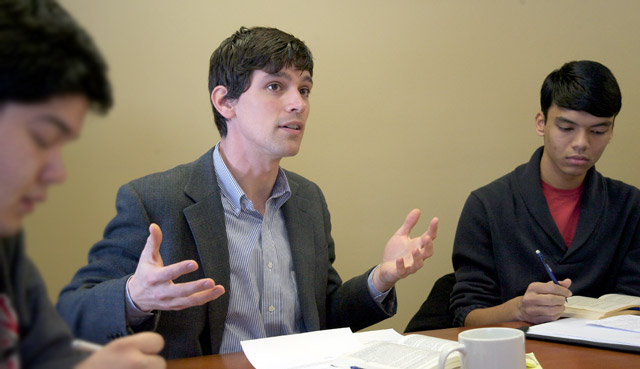Garrett Researches Social History, Literary Form in 18th, 19th Centuries

Matthew Garrett brings research interests in American literature, narrative theory, literary and social history, and social theory to Wesleyan’s Department of English.
Garrett, an assistant professor, joined the department in 2008. He has a B.A. from Bard College, a M. Phil. from Cambridge University, and a M.A. and Ph.D. from Stanford University.
“I came to Wesleyan to work with superb scholars and to teach students who are famous as some of the best in the world. That combination of active scholarship and exciting teaching is truly exceptional, and I think it distinguishes Wesleyan from both its liberal-arts and big-university peers,” he says. “Every professor wants a robust environment for both their writing and their teaching, and Wesleyan has a tradition of sustaining these mutually nourishing and interdependent activities.”
Garrett focuses his research and writing on the relationship between social history and literary form, particularly in Anglophone culture in the 18th and early 19th centuries.
“I’m interested in the ways literary forms enable people to imagine politics and social relationships,” Garrett says. During this period of transformations, of revolutions and counterrevolutions, “how does literature respond to social change? How do writers and readers use literature to make sense of experience? And how does literature sometimes affect politics?”
Garrett’s first book, which he’ll be finishing next year on a fellowship from the American Council of Learned Societies, is titled Episodic Poetics in the Early American Republic. The book traces the evolution of episodic writing in early American culture, including prose, novels, memoirs and linked serial essays.
“It’s interesting when a whole culture, like that of late-18th-century America, is saturated in episodic stories. I’ve found that there are good reasons for this, and that the episodic literature is better suited to that particular time and place than we’ve assumed,” Garrett says.
In addition to receiving the ACLS fellowship, in 2011, Garrett organized and chaired a panel on the politics of plot at the Biennial Conference of the Society of Early Americanists, where he also spoke on psychoanalytic approaches to early American literature. This year he has also given papers at the Modern Language Association Conference, on “Reading the Episode,” and at the American Society for Eighteenth-Century Studies Conference, on late-eighteenth-century historians’ understanding of time and events.
At Wesleyan, Garrett teaches courses on American literature from the colonial period to the Civil War, on the early U.S. novel, on transatlantic poetry between the 16th and 19th centuries, on the literature of revolution, and on narrative theory. He has taught two tutorials at Wesleyan, one on Moby Dick and 19th Century U.S. Politics, and the other on Nation and Subject Formation in the Early United States.
“My students consistently impress and challenge me — in the classroom, in tutorials, in meetings about theses, and also in more casual conversations,” he says.
After hours, he enjoys bicycling the winding Connecticut roadways and attending operas – an interest he “tries to counterbalance with a commitment to The Clash.” Garrett also enjoys films, favoring those of the late German director/screenwriter Rainer Werner Fassbinder.

